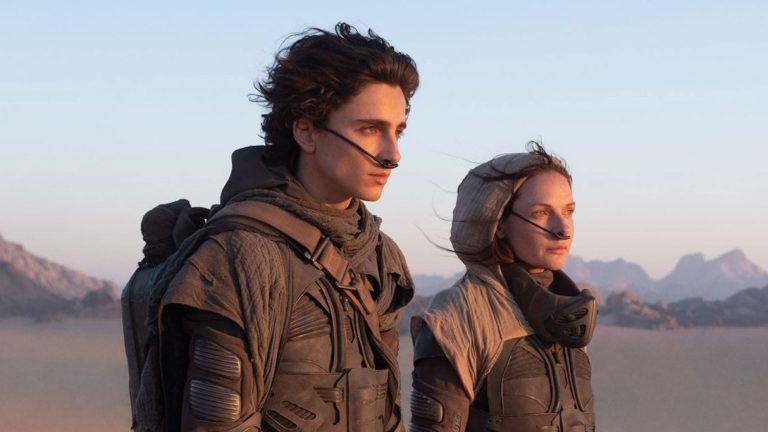Dune Review: A Sci-Fi Legend Is Born
Denis Villeneuve’s adaptation of Dune is an astonishing, immersive experience.

The spice melange is a psychotropic substance that floats across the surface of planet Arrakis like puffs of dandelions. This seems right since Denis Villeneuve’s interpretation of that world in Dune is similarly all-enveloping for any who lay eyes on it. It’s an experience intended to overwhelm and intoxicate. More than a few years have come and gone since a picture this vast in scope and immersive in intent has found the ambition (and financial support) to conquer multiplexes. But make no mistake, Dune is very much a film with conquest on its mind, both as a narrative and as a cinematic trip for the eyes and ears.
Pulling from Frank Herbert’s landmark science fiction novel—or about half of it, anyway—Villeneuve reaches for an epic on the scale of Star Wars and Lord of the Rings while also not so subtly evoking imagery from the ultimate desert odyssey, Lawrence of Arabia. While it’s too early to gauge whether he’s made a true classic for the ages like those touchstones, there’s little doubt the filmmaker has engineered the most impressive spectacle you can see in a theater this year (and you really should see this in a theater).
A gargantuan narrative about mythical chosen ones and boy heroes, great clashes of intergalactic houses, and sandworms the size of mountains, Villeneuve’s Dune is a visual feast. More satisfying though is it’s also a transportive journey for the mind. Novelist Herbert famously influenced George Lucas when Dune was published as a book in 1965, but the first good adaptation of his psychedelic (and frequently opaque) musings now comes to cinemas at a moment where visual grandeur is in desperate need of something weird and thoughtful. Well, Dune is very weird. Blissfully so.
Primarily focused on two warring dynasties in a future among the stars, Dune is a tale of feudal conflict between House Atreides and House Harkonnen (think the Starks and Lannisters). The Atreides are a noble if stoic people who already rule one idyllic planet. However, Duke Leto Atreides (Oscar Isaac) has been offered by the galaxy’s unseen emperor a gift too good to be true: the chance to take control of the desert planet Arrakis where the most valuable substance in the known universe is mined, spice melange.
Leto senses a trap in the offer since it comes at the expense of the galaxy’s richest family, his bitter rivals the Harkonnens and their grotesque patriarch, the Baron (Stellan Skarsgård). Yet the opportunity to exploit the universe’s most barren prize is irresistibly enticing. If the Duke can bring peace to the desert people of Arrakis, then that land will become the birthright of his son Paul Atreides (Timothée Chalamet). Meanwhile Paul has his own trepidations. Inheriting the supernatural gifts of his genuinely witchy mother, Lady Jessica (Rebecca Ferguson), Paul is plagued by visions of suffering and death on Arrakis… and also a seeming destiny drenched in power and holy war.
As a novel previously considered unfilmable—particularly after David Lynch and Dino De Laurentiis’ disastrous attempt to adapt it in 1984—Dune has clearly benefited from the evolution of special effects, with CG wizardry faithfully recreating Herbert’s most bizarre ideas. What makes Villeneuve’s film so majestic, however, is its determination to do as much of it as possible in-camera, and to provide Arrakis with a gritty, tactile quality.
Arrakis, as well as the Atreides homeworld of Caladan, feel lived in and entrenched in ancient histories that will occur thousands of years in our future. Bizarre hieroglyphic sandworms adorn desert castles while the Atreides’ native palace appears both starkly European and vaguely international, pulling from Asian and African influences. It’s a cinematic prophecy where governments have regressed and opulent vassal states rule all, which Villeneuve and production designer Patrice Vermette highlight by focusing as much on the dignity of wood and stone as they do space alloys and force fields.
This trenchant world-building could only be an asset for the film’s dizzyingly big ensemble. In fact, significant A-list talent even fills the margins in roles clearly earmarked for expansion down the road, including barely utilized actors like Javier Bardem, Josh Brolin, and Zendaya, with the latter having a fairly glorified, ethereal cameo. And yet, even these smallest parts contribute in imbuing the production with a total, almost fanatical conviction.
As the center of it all, Chalamet confirms on a grand scale what arthouse audiences have long known about his charisma. Despite playing an archetype that’s been well-worn out by the genre fare influenced by Dune, Chalamet comfortably holds the nearly three-hour movie on his shoulders by emphasizing Paul’s discomfort. Here is a young Chosen One who is weighed down by the burden of the tragic and possibly damned. He’s also complemented by Ferguson’s intriguing Lady Jessica, an aloof presence who deserves more floor space should Villeneuve ever finish adapting the novel.
But if I had to guess, the biggest scene-stealer for audiences will be Jason Momoa as an Atreides knight. Essentially the closest thing this movie has to a Han Solo, Momoa has not been this winning or devilish since his days on Game of Thrones, and he may be the lone tonic in a film that will drown certain audiences beneath its brooding tone.
The film is, indeed, very heavy on atmosphere and self-importance. And with its ponderous amount of characters and plot threads, it will undoubtedly overwhelm more than a few viewers. Much like the source material, this desert is dripping in high-minded pretensions. Villeneuve attempts to offset that with a lot more expository handholding than his previous sci-fi epics, Arrival and Blade Runner 2049, which bordered on tone poems. But that mostly makes the first act particularly top-heavy and perhaps clear to a fault. There’s a lot more prose here, yet I wonder if Villeneuve and his studio should’ve simply fully embraced the director’s abstract poetry.
Nevertheless, these are admittedly minor quibbles which hang in the margins for an experience that’s made one of the most foreboding science fiction sagas ever conceived fairly accessible to any audience willing to be transported. Dune is an astonishing swing of ambition and passion from filmmakers at the top of their craft, and it more often than not connects like a thunderbolt. As a project that is only meant to start a new cinematic cycle, it left me eager to follow this Paul and Villeneuve toward the next strange corner of Arrakis, and determined to return to the theater so I can see their introduction again, only next time in IMAX.
Dune premiered at the Venice Film Festival on Sept. 3 and plays at the Toronto International Film Festival on Sept. 11. It opens in theaters and on HBO Max on Oct. 22.

